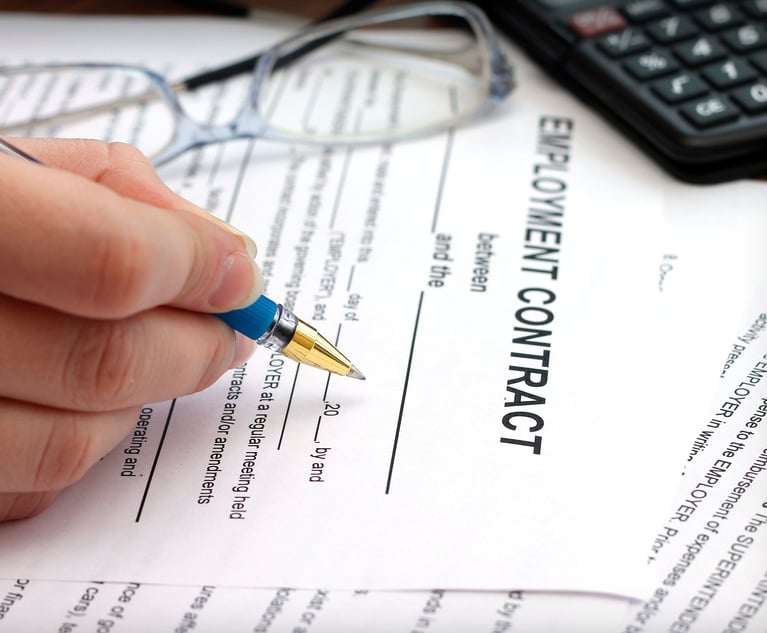Law Firms' 'Huge Missed Opportunity': The Morning Minute
The news and analysis you need to start your day.
February 07, 2022 at 06:00 AM
6 minute read

Want to get this daily news briefing by email? Here's the sign-up.
WHAT WE'RE WATCHING
SHOW YOUR SUPPORT - Law firms swear by the principle that it's wiser to try to gain more work from existing clients than to constantly focus on bringing in new ones. But shouldn't that concept also apply to hiring? As Law.com's Rhys Dipshan reports, some firms are training up their internal staff to fill e-discovery talent gaps created by a tight job market. And that means tapping paralegals to help support e-discovery projects, or even to become the next generation of e-discovery professionals themselves. Of course, bringing paralegals into the e-discovery fold isn't entirely new, though it is becoming increasingly common in light of a limited talent pool and a growing deluge of client discovery work. Still, it's far from a widespread practice—or something that many firms proactively support, whether by encouraging or paying for training. Mary Mack, executive director and chief legal technologist at EDRM, calls the current situation a "huge missed opportunity." She explains, "It's harder, I believe, to train people on legal functional requirements … but paralegals are very deep in legal process. They understand what discovery is, they understand what privilege is, they understand evidence and authenticity and exhibits and all of that. And so all they need to do is train them on the technical."
MISJUDGMENTS - The U.S. Department of Justice has determined that courts that prohibit litigants from taking prescribed medication for their opioid use disorder are in violation of the Americans With Disabilities Act, Law.com's Aleeza Furman reports. The DOJ investigation examined instances in which Pennsylvania judges enacted policies that stopped or limited people's use of medication that help to curb opioid dependence, such as methadone, buprenorphine and naltrexone. Attorneys involved in the case said the sweeping finding is "unprecedented" and stands to impact how courts across the country address opioid addiction. Sally Friedman, senior vice president of legal advocacy at the Legal Action Center in New York, said the nation's courts—and drug courts in particular—often require that individuals with opioid use disorder stop or limit their use of OUD medication. This finding, she said, is the first to determine that this practice violates the ADA and will serve as a warning to courts beyond the Pennsylvania UJS.
WHO GOT THE WORK?℠ - Dechert partner Andrew S. Wong has entered an appearance for Boiron Inc. in a class action over its Arnicare line of homeopathic pain relief products. The complaint, brought Jan. 4 in California Northern District Court by Bursor & Fisher, alleges that the defendant falsely markets its products as providing pain relief when there is no scientific evidence to support the claim. The case, assigned to U.S. District Judge Jon S Tigar, is 4:22-cv-00035, Chappell v. Boiron, Inc. >>Read the complaint on Law.com Radar and check out the most recent edition of Law.com's Who Got the Work?℠ column to find out which law firms and lawyers are being brought in to handle key cases and close major deals for their clients.
DO NOT CALL LIST - A former Trump aide sued Verizon Wireless on Friday in New Jersey District Court to block the release of his cellular records in response to a Congressional subpoena from the select committee investigating the Jan. 6 riots at the Capitol. The lawsuit, brought by King Moench Hirniak & Collins and Graves Garrett LLC on behalf of Robert Peede, seeks an injunction prohibiting the defendants from producing the plaintiff's cellular data and requests a declaration that the subpoena is invalid. Counsel have not yet appeared for the defendant. The case is 3:22-cv-00611, Peede v. Cellco Partnership D/B/A Verizon Wireless. Stay up on the latest deals and litigation with the new Law.com Radar.
EDITOR'S PICKS
WHILE YOU WERE SLEEPING
RAISING IRE - It's that time again, folks! Following another round of law firm pay raises, clients are mad as heck and (saying) they're not going to take it anymore. Still, while in-house outrage has become part of the elaborate dance the legal industry now performs each year, the latest protests are not solely centered on concerns that salary hikes will translate to rate hikes, Law.com International's Varsha Patel reports. GCs have also expressed worries about burnout. "It's not particularly responsible in terms of pressure on individuals," a GC of a fashion brand said, while a telecoms general counsel said that firms are "missing the point," given the focus on wellbeing during the pandemic. She explained that the extreme salaries essentially translate to "you have no life outside of this firm", adding: "In some ways, the pay war is masking the real problem, which is the sort of lifestyles that lawyers are forced to lead." Of course, the rate issue is still rankling clients, too. "If law firms try to charge me increased fees for trainees, I won't be paying them," the fashion GC told Patel, while a fintech GC said this cost is already being passed to the client.
WHAT YOU SAID
"It's the biggest bunch of balderdash anybody's ever tried to sell."
This content has been archived. It is available through our partners, LexisNexis® and Bloomberg Law.
To view this content, please continue to their sites.
Not a Lexis Subscriber?
Subscribe Now
Not a Bloomberg Law Subscriber?
Subscribe Now
NOT FOR REPRINT
© 2025 ALM Global, LLC, All Rights Reserved. Request academic re-use from www.copyright.com. All other uses, submit a request to [email protected]. For more information visit Asset & Logo Licensing.
You Might Like
View All
Rising Varied Investment Products, Regulatory Activity Drive Demand in Investment Funds

NHL Agent, Business Can't Sell Assets to Dodge $1M in Judgments, Federal Judge Says
Law Firms Mentioned
Trending Stories
Who Got The Work
J. Brugh Lower of Gibbons has entered an appearance for industrial equipment supplier Devco Corporation in a pending trademark infringement lawsuit. The suit, accusing the defendant of selling knock-off Graco products, was filed Dec. 18 in New Jersey District Court by Rivkin Radler on behalf of Graco Inc. and Graco Minnesota. The case, assigned to U.S. District Judge Zahid N. Quraishi, is 3:24-cv-11294, Graco Inc. et al v. Devco Corporation.
Who Got The Work
Rebecca Maller-Stein and Kent A. Yalowitz of Arnold & Porter Kaye Scholer have entered their appearances for Hanaco Venture Capital and its executives, Lior Prosor and David Frankel, in a pending securities lawsuit. The action, filed on Dec. 24 in New York Southern District Court by Zell, Aron & Co. on behalf of Goldeneye Advisors, accuses the defendants of negligently and fraudulently managing the plaintiff's $1 million investment. The case, assigned to U.S. District Judge Vernon S. Broderick, is 1:24-cv-09918, Goldeneye Advisors, LLC v. Hanaco Venture Capital, Ltd. et al.
Who Got The Work
Attorneys from A&O Shearman has stepped in as defense counsel for Toronto-Dominion Bank and other defendants in a pending securities class action. The suit, filed Dec. 11 in New York Southern District Court by Bleichmar Fonti & Auld, accuses the defendants of concealing the bank's 'pervasive' deficiencies in regards to its compliance with the Bank Secrecy Act and the quality of its anti-money laundering controls. The case, assigned to U.S. District Judge Arun Subramanian, is 1:24-cv-09445, Gonzalez v. The Toronto-Dominion Bank et al.
Who Got The Work
Crown Castle International, a Pennsylvania company providing shared communications infrastructure, has turned to Luke D. Wolf of Gordon Rees Scully Mansukhani to fend off a pending breach-of-contract lawsuit. The court action, filed Nov. 25 in Michigan Eastern District Court by Hooper Hathaway PC on behalf of The Town Residences LLC, accuses Crown Castle of failing to transfer approximately $30,000 in utility payments from T-Mobile in breach of a roof-top lease and assignment agreement. The case, assigned to U.S. District Judge Susan K. Declercq, is 2:24-cv-13131, The Town Residences LLC v. T-Mobile US, Inc. et al.
Who Got The Work
Wilfred P. Coronato and Daniel M. Schwartz of McCarter & English have stepped in as defense counsel to Electrolux Home Products Inc. in a pending product liability lawsuit. The court action, filed Nov. 26 in New York Eastern District Court by Poulos Lopiccolo PC and Nagel Rice LLP on behalf of David Stern, alleges that the defendant's refrigerators’ drawers and shelving repeatedly break and fall apart within months after purchase. The case, assigned to U.S. District Judge Joan M. Azrack, is 2:24-cv-08204, Stern v. Electrolux Home Products, Inc.
Featured Firms
Law Offices of Gary Martin Hays & Associates, P.C.
(470) 294-1674
Law Offices of Mark E. Salomone
(857) 444-6468
Smith & Hassler
(713) 739-1250










